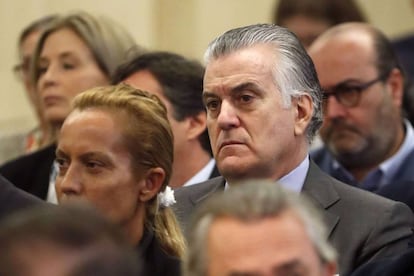Zombie government
The Gürtel ruling has left Spanish Prime Minister Mariano Rajoy without a leg to stand on

Spain’s High Court, the Audiencia Nacional, considers it a proven fact that there was “an authentic and efficient system of institutional corruption” created by the Popular Party (PP) and by the business network headed by Francisco Correa; it also gives credence to the existence of a party slush fund, while rejecting the credibility of Prime Minister Mariano Rajoy’s court testimony last year. In its ruling made public yesterday, the High Court sentenced 29 out of the 37 defendants to long prison terms: 51 years for Correa, and 33 for former party treasurer Luis Bárcenas, who has also been fined €44 million. His wife Rosalía Iglesias is facing 15 years behind bars.
This judgment leaves Rajoy in a position that is incompatible with the political and moral authority that is required to carry out his duties
There is no precedent in democratic Spain for such a blow, which badly affects the credibility of a party that has governed this country between 1996 and 2004 and again from 2011 to the present time, not to mention the fact that it controls major regional and local governments. Other Gürtel-related proceedings are underway and will continue to uncover the irregularities that went on in the regions of Valencia and Madrid, and in numerous municipalities.
But the Thursday ruling, which ends the main trial in the sprawling Gürtel case, puts an inexorable spotlight on the miseries of an entire political era in Spain, and on a governing style that current party leaders cannot now distance themselves from, or remain politically immune to.
Throughout the nine-year investigation, Prime Minister Rajoy, PP Secretary General Dolores de Cospedal, and former regional premiers who lost their positions due to Gürtel’s long shadow – such as former Valencia premier Francisco Camps or former Madrid premier Esperanza Aguirre – have all denied the facts, gone on the defensive, and even declared themselves, in an insufferable display of cynicism, victims of corrupt practices. The judicial conclusion that they had been awaiting as a way to stave off criticism and suspicion during the investigation has arrived, and it is devastating.
There must be an end to their constant denial of the facts, and their claim that those events are a thing of the past, a past that has supposedly been overcome. Just like they did following the arrest of former PP minister Eduardo Zaplana earlier this week, PP spokespeople and officials are now scrambling to prove that the specters of the past are not coming back to haunt them. But society cannot accept this opportunistic attitude, nor the dialectical pirouettes with which they seek to distance themselves from the era of former Prime Minister José María Aznar, particularly since Rajoy represents the connection between then and now.
There must be an end to the constant denial of the facts, and the claim that those events are a thing of the past
The Thursday ruling strips the prime minister of his power, and Rajoy should be able to admit, beyond the damage and plundering of society that went on for years, that the pillars on which he continues to govern this country have been eroded. This judgment leaves Rajoy in a position that is incompatible with the political and moral authority that is required to carry out his duties.
The government was already hurt by its management of the Catalan independence crisis, and by the weakness of its parliamentary minority. The damage is now far greater, as this ruling sets out in black and white the murky financial practices of the governing party, the way it dealt with the problem, and its complete failure to set an example for society. The justice system has done its job, and we should congratulate ourselves for it. But politics has not, and it can no longer hide under the mantle of impunity.
English version by Susana Urra.
Tu suscripción se está usando en otro dispositivo
¿Quieres añadir otro usuario a tu suscripción?
Si continúas leyendo en este dispositivo, no se podrá leer en el otro.
FlechaTu suscripción se está usando en otro dispositivo y solo puedes acceder a EL PAÍS desde un dispositivo a la vez.
Si quieres compartir tu cuenta, cambia tu suscripción a la modalidad Premium, así podrás añadir otro usuario. Cada uno accederá con su propia cuenta de email, lo que os permitirá personalizar vuestra experiencia en EL PAÍS.
¿Tienes una suscripción de empresa? Accede aquí para contratar más cuentas.
En el caso de no saber quién está usando tu cuenta, te recomendamos cambiar tu contraseña aquí.
Si decides continuar compartiendo tu cuenta, este mensaje se mostrará en tu dispositivo y en el de la otra persona que está usando tu cuenta de forma indefinida, afectando a tu experiencia de lectura. Puedes consultar aquí los términos y condiciones de la suscripción digital.








































